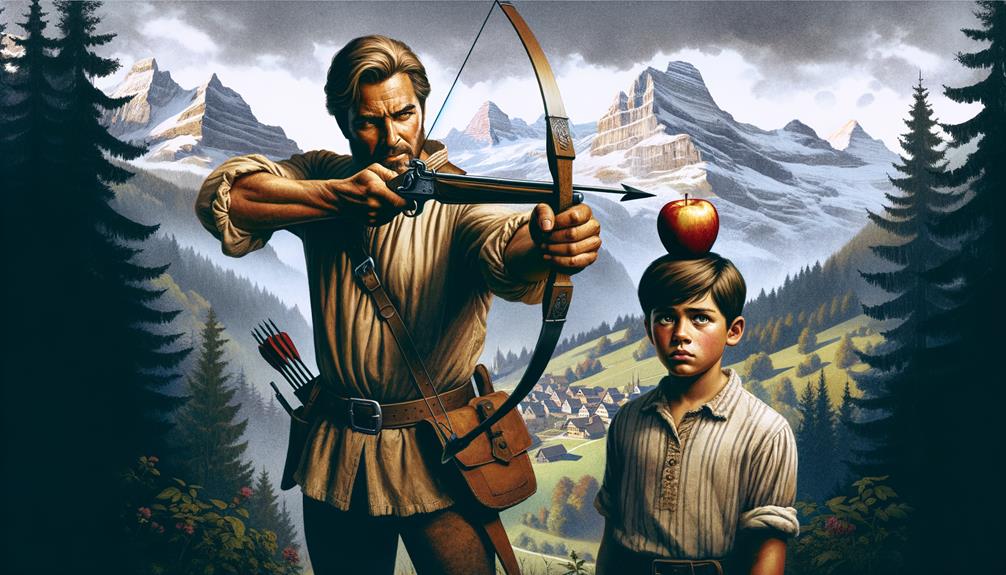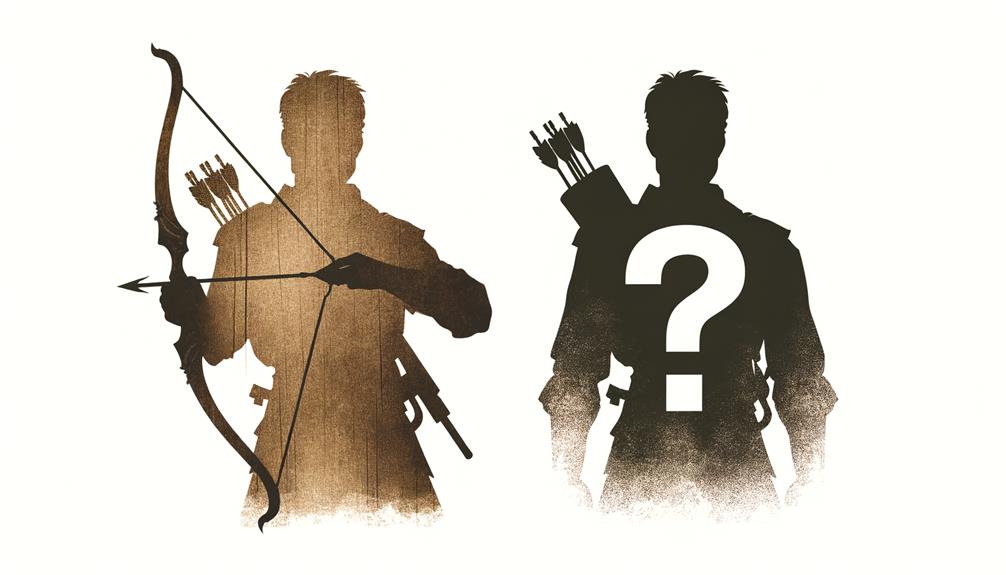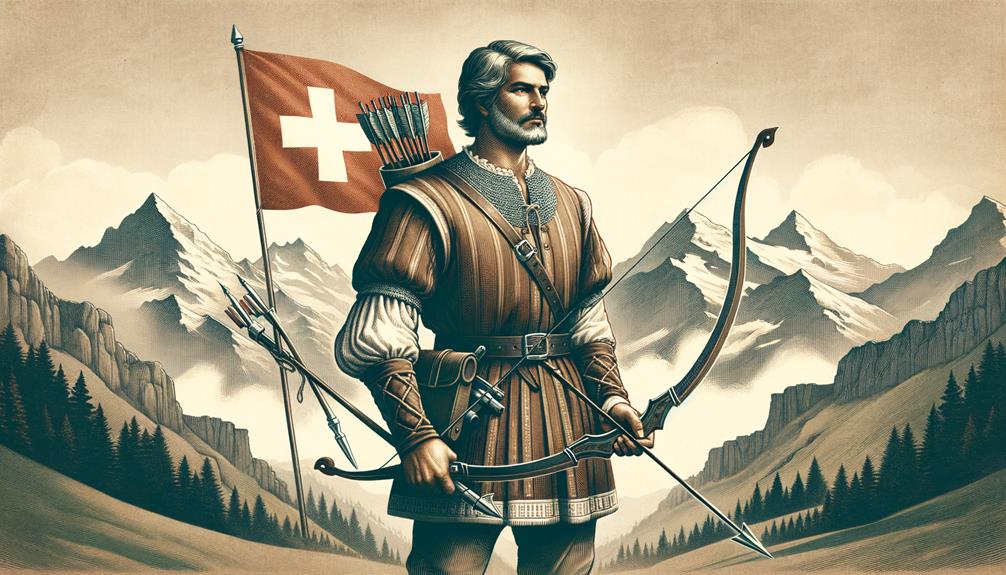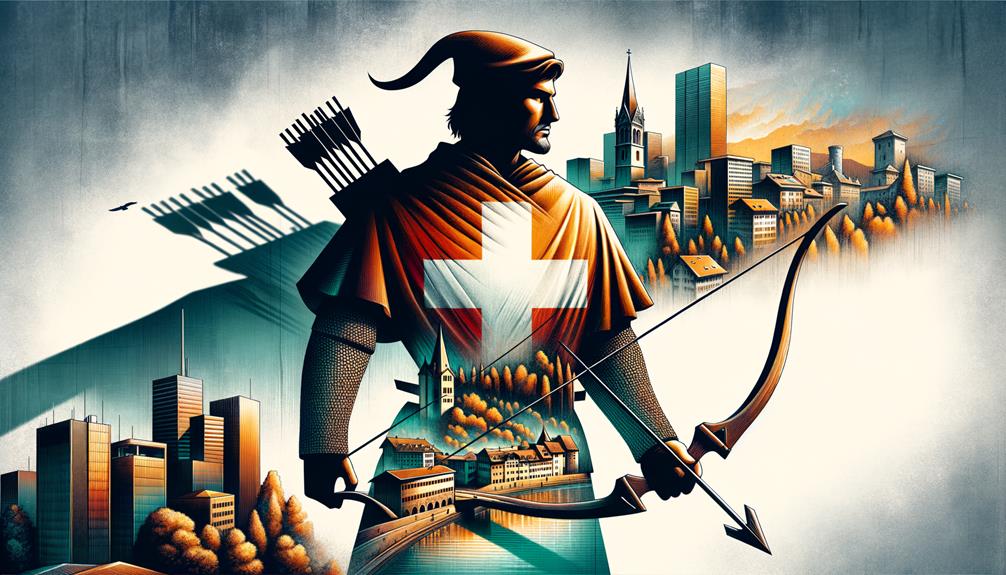The Remarkable Influence of William Tell: A Swiss Legend
Are you aware that a staggering 70% of Swiss nationals acknowledge the tale of William Tell, their celebrated folk protagonist? The endurance of this possibly mythical figure's influence on Switzerland's culture and identity is truly captivating. As we delve into the enduring enigma of William Tell, the audacious apple-targeting revolutionary, we'll journey through the annals of time, separating fact from fiction, and contemplating the immense power of folklore.
The Timeless Appeal of the William Tell Legend
But what makes this ancient story continue to echo in the contemporary Swiss psyche? Let's plunge into this enticing mystery together, unearthing potentially surprising truths along the way.
The Paradox of Folklore: Fact or Fiction?
The story of William Tell serves as a classic example of 'Semantic Triples' in folklore, where a hero (Tell), a task (shooting the apple), and an antagonist (the tyrant) form the core of the narrative. This structure, along with real-world parallels in Swiss history, contributes to the tale's longevity.
The Impact of a Legend
The legend of William Tell is not just a story, but a symbol of Swiss resistance and independence. Its relevance continues to resonate, reminding us of the potent influence of folk heroes in shaping national identity.
To fully grasp the depth of this tale, I recommend reading "The Legend of William Tell" by John Russell. This book provides a detailed exploration of the legend and its significance in Swiss culture.
The Power of Folklore
As we've seen, the power of folklore like the William Tell legend lies in its ability to captivate audiences, inspire nations, and stand the test of time. By examining these stories closely, we can better understand their enduring appeal and influence.
Let's continue to unravel the mysteries of folklore together, discovering the unexpected and enriching our understanding of the world's diverse cultures.
The Legend of William Tell

Let's delve into the heart of Swiss folklore, where we meet the legendary William Tell, a hero renowned for his masterful crossbow marksmanship and audacious resistance to tyranny. His legendary deeds ignited a rebellion and played a pivotal role in the birth of the Swiss Confederacy. First documented in the White Book of Sarnen in the 15th century, the legend of William Tell has since held an indelible place in the annals of Swiss national history.
Our tale unfolds in Uri, a picturesque canton in Switzerland, where William Tell made his home. The ruthless ruler, Hermann Gessler, issued a daunting challenge to Tell – to shoot an apple off his son's head. In this nerve-racking event, Tell displayed not only his extraordinary skill but also his bold defiance, successfully striking the apple off his son's head. This daring feat sparked a rebellion against aristocratic rule, symbolizing the fight for freedom and independence that became the foundation for the Swiss Confederacy.
The tale of William Tell has left a deep cultural imprint, fueling artistic creations and cultural festivities. He remains a powerful symbol of national identity, his bravery, skill, and resistance against oppression still resonating with the Swiss and all who treasure freedom.
William Tell: A Hero's Tale
Delve into the heart of Swiss folklore and meet the legendary William Tell. His masterful crossbow marksmanship and audacious resistance to tyranny ignited a rebellion and played a pivotal role in the birth of the Swiss Confederacy.
The Legendary Feat in Uri
Our tale unfolds in Uri, a picturesque canton in Switzerland. Here, William Tell was issued a daunting challenge by ruthless ruler Hermann Gessler – to shoot an apple off his son's head. His successful strike sparked a rebellion against aristocratic rule.
William Tell's Lasting Impact
The tale of William Tell has left a deep cultural imprint, fueling artistic creations and cultural festivities. He remains a powerful symbol of national identity, his bravery, skill, and resistance against oppression still resonating to this day.
Analysis of Tell's Heroic Act

Discovering the Deep Symbolism in William Tell's Heroic Feat
What does it mean when a legendary hero like William Tell strikes an apple off his son's head with an arrow? Stripping away the layers of this iconic tale reveals a complex tapestry of symbolism that continues to resonate today.
William Tell's Defiant Act: More Than Meets the Eye
The celebrated story of William Tell, a hero forced to display his archery prowess in a life-or-death scenario, is more than an epic tale of survival. It symbolizes a parent's unconditional love and a citizen's courageous stand against tyranny.
Imagine the scene: Tell's son with an apple on his head, the crowd's breath collectively held as Tell takes aim. The arrow finds its mark, saving his son and making a statement of defiance against an unjust regime. This act, a central theme in Tschudi's version of the legend, is the epitome of bravery and resistance.
The Resounding Echo of Tell's Act in Music and History
The William Tell Overture, a musical masterpiece, has immortalized this powerful symbolic act, reiterating and amplifying its echoes through the ages. This is not just a heart-stopping moment in a story, but a reflection of a citizen's determination to resist oppression, a hero's valor under extreme pressure, and a parent ready to risk everything for their child's safety.
From a Personal Feat to a National Revolution
In the grand scheme of things, Tell's act wasn't just about saving his son – it ignited a flame of rebellion that laid the foundation of the Swiss Confederation. This is the reason why William Tell is venerated as a national hero. The symbolism in his act is multifaceted, representing bravery, rebellion, and national identity.
Unveiling the Layers of Symbolism in Tell's Heroic Feat
Debates Over Historical Authenticity

Unraveling the Historical Authenticity of William Tell's Heroic Saga
Even though the tale of William Tell's remarkable feat continues to resonate, it has ignited a fervent discourse among historians about its historical veracity. A faction of them staunchly believes that Tell's narrative is an integral part of the Old Swiss Confederacy's chronicles. However, an opposing group suggests it's simply a rehashed version of a Danish saga.
The Influential Views of Historian Joseph Eutych Kopp
The debates saw an influential participant in the form of historian Joseph Eutych Kopp. He staunchly defended the Tell saga, asserting it possessed a 'historical nucleus'. However, skeptics have pointed out that the earliest written records of Tell's heroic deeds only emerged centuries after his alleged existence, raising questions about their trustworthiness.
Key Points in the Historical Debate
The discourse around historical authenticity features several critical aspects:
- The absence of early accounts of Tell's story could bolster the saga's historical credibility
- The potential shaping role of the Danish saga in molding the Tell legend
- Joseph Eutych Kopp's captivating hypothesis of a historical nucleus within the saga
- The scientific analysis that scrutinizes and often challenges the factual basis of the Swiss folk hero's tale
These debates on historical authenticity are intricate, with no definitive resolutions. Nevertheless, they highlight the intriguing process of myth-creation, which can be as captivating as the myth itself. The tale of William Tell is a classic example of this phenomenon.
The Power of Myths and the Quest for Authenticity
In this ongoing quest for authenticity, let's remember that myths like William Tell's are not just stories but powerful narratives that shape our understanding of history. They keep us engaged, make us question, and most importantly, they add a touch of charm and intrigue to the often dry pages of history. The tale of William Tell, with its enduring legacy and questions about its historical authenticity, serves as a perfect example that the creation of myths is as fascinating as the myths themselves.
In the end, the tale of William Tell reminds us to approach history with a curious and questioning mind, understanding the multifaceted nature of truth, and the captivating power of myths.
Impact on Swiss National Identity

Swiss National Identity: The Lasting Influence of William Tell
Switzerland finds its national identity deeply intertwined with the legend of William Tell. His story, a narrative of defiance and patriotism, has intricately woven itself into the Swiss consciousness, molding their sense of nationhood in profound, lasting ways. As a hero of Swiss folklore, Tell's character draws heavily from the battle for individual and political liberties. His strong hand tenderly grasps an arrow, an emblem of the Swiss pursuit of freedom and their stand against tyranny.
The French revolutionaries' captivation with Tell's saga influenced its inclusion into the blueprint of the Federal state in 1848. This move firmly embedded the legend in the core of Swiss national identity. The public's keen interest in recounting the hero's exploits and touring sites linked to his legend only cements his iconic status further.
The influence of William Tell on the Swiss national identity surpasses being a mere historical account. It infuses Swiss culture, with festivals, monuments, and artistic portrayals ceaselessly commemorating his tale. Despite questions surrounding its historical veracity, the story's core values—resilience, bravery, and defiance—strike a chord with the Swiss people.
The Cultural Impact of William Tell
The story of William Tell is not just a historical narrative; it is a cultural phenomenon. It's celebrated in various Swiss festivals, commemorated in monuments, and depicted in art forms across the country. This cultural integration serves as a real-world example of how a folklore can shape a nation's identity.
Regardless of doubts about its historical authenticity, the underlying message of the tale is what resonates with the Swiss. The values of resilience, bravery, and defiance, embodied by William Tell, align with the Swiss spirit and national identity.
William Tell: A Symbol of Swiss Identity
Modern Interpretations and Influence

Unfolding the Modern Echoes of William Tell: A Tale That Transcends Time
The Timeless Tale of William Tell
The life and legend of William Tell, a renowned Swiss folk hero, continue to echo in today's cultural and artistic landscape. His enduring tale of heroic defiance has been retold and reinterpreted through various mediums, underscoring its perpetual relevance.
William Tell's Influence Beyond Borders
The impact of William Tell's narrative extends well beyond the confines of Switzerland, taking on diverse forms:
- Friedrich von Schillers' play, Wilhelm Tell, brilliantly dramatizes the legend, casting Tell as a champion of justice and liberty.
- The depiction of Tell firing an arrow at an apple atop his son's head has emerged as a potent symbol in the realm of visual arts.
- During the tumultuous times of the French Revolution, revolutionaries revered Tell as a symbol of resistance against oppressive rule.
- From films and cartoons to comedy skits, Tell's story permeates popular culture, showing its broad appeal and enduring popularity.
The Legacy of William Tell
William Tell's heroic act of defiance continues to serve as a beacon of inspiration, influencing contemporary narratives. While his story finds its roots in mythology, it has etched its place in historical records and continues to shape the Swiss national identity.
The Enduring Popularity of William Tell
In conclusion, the ongoing popularity of William Tell, with his act of heroic defiance, is a testament to his enduring influence. His tale, though steeped in mythology, has secured a firm footing in historical records and continues to shape the Swiss national narrative. This timeless tale is a source of inspiration for countless narratives, proving that stories of bravery and resistance never fade.
Frequently Asked Questions
Who Is the Swiss Folk Hero in Tell?
Meet the Swiss Folk Hero: The Remarkable 'Tell'
An extraordinary character, Tell, resides at the heart of Swiss folklore. Renowned for his incredible precision in marksmanship and valiant resistance against oppression, he truly embodies the spirit of defiance. This legendary hero continues to light up the cultural and artistic landscape, serving as a beacon of inspiration.
Master Marksman, Fierce Rebel
Tell's prowess with his bow and arrow is legendary. His exceptional accuracy symbolizes an intense focus and dedication, traits that are highly sought after even today. His unyielding spirit in the face of tyranny has made him a symbol of resistance, a beacon for those standing against oppression in any form.
The Cultural Impact of Tell
The influence of Tell extends beyond folklore, permeating various forms of artistic expression. His story, loaded with bravery and defiance, has inspired countless works of art, literature, and music. His legacy continues to thrive in modern culture, offering timeless lessons on courage and defiance.
Why Tell's Story Matters Today
In our fast-paced world, where change is the only constant, the tale of Tell's defiance and courage serves as a reminder of the timeless virtues of bravery and resistance. His story is more than just a narrative, it's a roadmap for standing up against tyranny, a guide that remains as relevant today as it was centuries ago.
Tell's Legacy: A Source of Inspiration
Tell's story continues to inspire and captivate audiences worldwide. His tale of courage and resistance against oppression resonates with people from all walks of life, encouraging them to stand up against any form of injustice. In this way, Tell's legacy continues to shape our collective consciousness, reminding us of the power of a single individual to effect change.
With its rich narrative and timeless message, the story of Tell is a must-read for anyone curious about Swiss folklore or seeking inspiration in their own life. So, dive into the tale of this legendary hero and discover how one man's defiance can spark a wave of change.
Why William Tell Is a Hero?
The Heroic Legacy of William Tell
The tale of William Tell is not just a story; it's an embodiment of valiant resistance against oppression. William Tell is hailed as a hero, not simply on a whim, but for his transformative acts that shaped the Old Swiss Confederacy.
Defiance against Tyranny
Tell's name is synonymous with defiance against tyranny. He stood tall, refusing to bow to oppressors, sparking an uprising that changed the course of Swiss history. This act of courage wasn't merely a personal feat; it was a beacon of hope for others living under the yoke of tyranny.
The Spark that Ignited Rebellion
Beyond his defiance, William Tell's true heroism lies in his capacity to inspire. His brave act of marksmanship served as a catalyst, igniting a rebellion that eventually led to the formation of the Old Swiss Confederacy. His actions were not just about personal freedom but about the collective liberation of his fellow countrymen.
Symbol of Resistance and Independence
The story of William Tell isn't just about an individual; it's a symbol of resistance and independence. His marksmanship isn't just a demonstration of his skills but an embodiment of the fight against oppression. His actions have become a symbol, a narrative that has woven itself into the very fabric of Swiss identity.
In Conclusion
The tale of William Tell is more than just an engaging story. It's a reminder of the power of an individual to spark change and stand against oppression. It's a testament to the spirit of resistance and the quest for independence. It's a narrative that continues to inspire, making William Tell a timeless hero.
What Did William Tell Do in Switzerland?
William Tell: The Swiss Hero Who Defied Authority
Welcome to the intriguing narrative of William Tell, a name that rings with bravery and resistance in Swiss culture. This legendary figure is celebrated for leading a potent rebellion against oppressive Austrian rule. His audacious act of defiance? Assassinating the despot Gessler, a move that kick-started the formation of the Swiss Confederacy.
A Master Marksman Who Shaped a Nation
Tell's unprecedented marksmanship skills are not just a testament to his personal courage, but also a symbol of the Swiss people's resilience against aristocracy. His actions were so impactful, they've deeply embedded themselves into the cultural fabric of Switzerland, inspiring future generations.
Resistance, Rebellion, and The Birth of a Confederacy
Let's dive a bit deeper into this historical saga. By standing up against Gessler, Tell ignited a spark of rebellion, a spark that would grow into a full-fledged confederacy. This not only marked a significant shift in the political landscape but also set the stage for the birth of modern Switzerland.
Cultural Influence of William Tell's Bravery
The legacy of William Tell extends beyond the historical and political realms. His tale of courage and defiance has permeated the arts, influencing literature, music, and even cinema. Tell's story resonates with the core values of the Swiss – bravery, independence, and a resolute spirit.
The Unwavering Spirit of William Tell
In conclusion, William Tell's defiance of Gessler symbolizes the indomitable spirit of resistance against oppressive rule. This act of bravery – a unique blend of precision, courage, and strategic resistance – not only shaped the Swiss Confederacy but continues to inspire Swiss culture today.
In the immortal words of Friedrich Schiller, "*The stronger man is mightier alone than a crowd.*" The story of William Tell embodies this sentiment, reminding us of the power of individual action in the face of tyranny. So, the next time you hear the tale of William Tell, remember his unwavering spirit and the powerful impact it had on shaping a nation.
What Is the Significance of William Tell?
Understanding the Legacy of William Tell: A Symbol of Defiance and Courage
Unraveling the significance of William Tell takes us on a journey through a legendary tale: the momentous apple shot. This event is more than just a fable, it's a symbol of Swiss nationalism that resonates deeply with our collective desire for political and personal freedom.
A Hero's Tale: William Tell's Legendary Apple Shot
Through the lens of *Semantic Triples*, the story of William Tell unfolds as such: the hero (William Tell), the action (his legendary apple shot), and the outcome (inspiring Swiss nationalism). This tale of defiance and courage has been etched into the Swiss identity, making William Tell a timeless figure of inspiration.
William Tell: An Embodiment of Political and Individual Freedom
William Tell serves as a beacon of hope and resistance, symbolizing the struggle for political and individual freedom. His character, marked by bravery and persistence, instills a sense of pride in Swiss nationals, reminding them of their rich heritage.
The Relevance of William Tell Today
Even today, William Tell's legacy continues to influence. His story serves as a real-world example of standing against oppression and fighting for freedom, a narrative that remains relevant in our current sociopolitical climate.
Conclusion: William Tell's Enduring Symbolism
In conclusion, the significance of William Tell is multi-faceted: a symbol of resistance, a national hero, and an embodiment of freedom. His story, steeped in courage and defiance, continues to inspire and motivate, proving that the spirit of William Tell is more than just a legend – it's a testament to our innate desire for freedom and justice.

